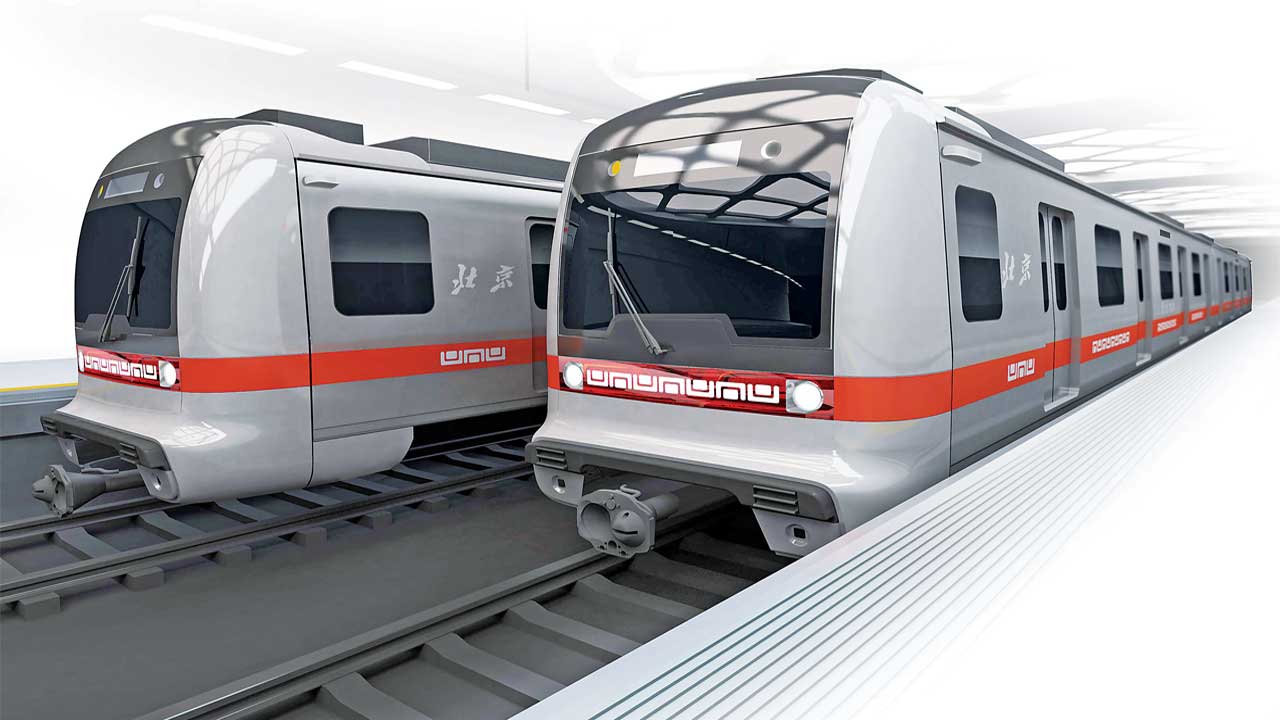
The Metro Express project has been in the limelight since long. After the recent official launch on 10th March 2017, it has become the talk of the town. While bus employees are showing resentment, other quarters are optimistic about the benefits of the light rail system.
On the 10th March, the Prime Minister Pravind Jugnauth unveiled the Commemorative Plaque at the Old Train Station in Caudan. In his address, the Prime Minister underlined that the Metro Express is not just another infrastructure investment, but is a game changer in a wider development perspective. He pointed out that the country, as a small island, is far reaching its limits in terms of accommodating new road networks and highlighted the overwhelming pressure on the existing transport system and serious constraints posed by traffic jams on commuters, the environment and the Nation’s productivity.
“It is estimated that traffic congestion is costing the country Rs 4 billion every year and, that this cost is projected to more than double to reach some Rs 10 billion by 2030,” stated Pravind Jugnauth. Consequently, the Government of Mauritius has set up Metro Express Limited, a company, to implement the project.
The Metro Express Project will have a main line of 26 km in length spanning from Curepipe to Port Louis and will comprise of 19 stations, including four interchangers. Each station will be a cluster of economic activity which will have significant spillovers on its surroundings and provide cost opportunities for small and medium enterprises.
The Prime Minister further stated that the Metro Express project is expected to generate net job creation in the transportation sector itself and dismissed any apprehensions about job losses amongst bus employees. He assured that there will be full consultations with stakeholders, particularly bus employees, bus owners and bus companies with a view to coming up with win-win solutions. Pravind Jugnauth emphasised that it is estimated that in its construction phase, the Metro Express Project will create around 7,000 full time equivalent jobs and contribute to Rs 13 billion to National Output.
“We are expecting even greater economic and social spin-offs, as it will be a safer and environmentally cleaner mode of transportation,” said the Prime Minister.
For his part, the Minister of Public Infrastructure and Land Transport recalled that Mauritius, this year, will be a vast construction site with government investing some Rs 50 billion in a new National Transport Network involving the implementation of the new Road Decongestion Programme.
Metro will reduce the number of fatal accidents
Experts of Singapore Corporation Enterprise (SCE) believe that, in addition to relieving traffic congestion, the Metro Express could improve road safety. They forecast that the Metro Express could reduce, by an average of 10 to 20 per cent, the number of deaths on our roads. A source at the Prime Minister's Office (PMO) also shares the same opinion. “Once the Metro Express is in operation, we expect it to carry an average of 100,000 passengers per day. One of the goals of the Metro Express is to discourage people from using their vehicles on a daily basis and, in so doing, will considerably reduce the number of accidents,” uttered the source. The authorities are setting up several strategies to encourage the public to use the Metro Express, namely the new tariff. The government is in favour of the use of the 'smart card' that works with credit and travel 'packages'. Another source from the Prime Minister’s Office also explains that as second option, but depending on the evolution of the situation, a tax of entry in Port Louis could be imposed on motorists. “This formula is already in effect in Singapore, because traffic jams in that country represent a significant financial cost. Those who are at the origin of the traffic jam are therefore penalised,” he says. It is good to know that the number of fatal accidents per year in Mauritius is of 150.
 Wakeel Lalloo: “We are afraid for our future”
Wakeel Lalloo: “We are afraid for our future”
Representative of the Union of Bus Industry Workers (UBIW), Mr Wakeel Lalloo explains that with the introduction of Metro Express, around 2,000 families will be impacted due to loss of employment. “Bus industry employees are in a stressful situation. They are afraid for the future. The government has not met these employees yet. We do not know what will happen to us. There are many elements that remain unclear. We are still unaware of the ticket price, whether old persons, students and invalid passengers will receive the same benefits as under the free transport scheme,” he says.
The trade unionist argues that there is a need for modernisation but not at the detriment of people. “With the introduction of the Metro Express, there will be 40 per cent less commuters on the Curepipe to Port Louis route. The main reason put forward is the project will reduce traffic jam but other solutions could have been implemented. The government could have introduced flexi-time or decentralised various public units or departments.”
For Wakeel Laloo, there is a high possibility that the project might incur losses. “The government is making huge investments and the probability for the investment to be profitable in the long run is low for obvious reasons. Firstly, in Mauritius many individuals prefer to go to work in their cars. Despite different feeder routes to the metro stations, many people will not leave their cars in a parking lot to travel by train. Authorities cannot just compare Mauritius with Singapore. We are two different States. After nine in the morning, the number of commuters is low. Do you expect a light rail system to be viable by transporting only ten or twenty persons during the day? After six or seven in the evening, people do not travel. The concept 24/7 has not been developed in the country. People are afraid to travel at night. So the Metro Express will not be able to operate as it should,” he reveals.

 Poorranarnenden Sungeelee: “The entire transportation scenario will get worse”
Poorranarnenden Sungeelee: “The entire transportation scenario will get worse”
Engineer Poorranarnenden Sungeelee questions the viability of the Metro Express and reveals that the project will increase the public debts rather than solving the problem of our mode of public transport.
“A light rail like the Strasbourg drives at 19.1 km/h and time taken from Curepipe to Port-Louis is one hour 26 minutes. In Mauritius, with a vertical drop of 600m between Port Louis and the central plateaus, as well as passing through Sodnac, the commuting time can reach 1hour 45 minutes. Moreover, those not travelling by car will have to waste more time. They have to take a bus from their hometown, reach the metro station to take the train. Now, once in Port Louis, he has to travel again by another bus to reach his place of work. In all, the entire transportation scenario will get worse.”
Poorranarnenden Sungeelee further explains that the Mauritian government will be spending around Rs 47 billion on the metro. “In 2006, the price was Rs 0.85 billion (Mauritian rupees) per km. For a journey of 27.3 km the cost will reach Rs 23.2 billion. With an inflation rate of 8% in India over the past ten years, the price has doubled. So, it will obviously cost around Rs 47 billion, even without taking into account the cost of insurance and freight.”
The engineer also questions the comfort of the passengers. “Usually, in the metro as proposed 90 per cent of the passengers may be standing rather than sitting. India has been used to these kind of situations. They can easily travel in a congested transport. But in Mauritius, the people are not used to such situations. Moreover, the price of the ticket will not be as cheap as presumed. Without subsidies, the ticket of metro around the world costs three or five times more than bus fares. Now just calculate the cost in the Mauritian context.”
The capital cost will not be recovered in the local context, highlights Poorranarnenden Sungeelee. “In Kuala Lumpur, a metro known as Star LRT made a deficit of Rs 48 billion after six years of operation. Now, think about the investment Mauritius is making and what might be the impact if it fails.”
According to him, India might be using Mauritius to field out a prototype of its metro system. The engineer recalls that Indian Prime Minister Narendra Modi has announced that ten different metro systems will be introduced across different Indian States. “France has stopped manufacturing metro and so has Canada. France has recently transferred its technology to India. Now India is in turn convincing Mauritius to introduce the metro. All that has been said so far about the metro does not reflect reality,” concludes Poorranarnenden Sungeelee.
 Suttyhudeo Tengur: “There is need for a new mode transport”
Suttyhudeo Tengur: “There is need for a new mode transport”
President of the Association of Consumers and the Environment (APEC), Mr Suttyhudeo Tengur argues that Metro Express is a modern project and that should have seen daylight over ten years ago. “It has become quite common for people to complain whenever a new project is announced. The same is happening for Metro Express. We are already late in introducing the Metro and if we wait more, we will be facing more financial burdens. Mauritius is already facing congestion issues which are costing the country around Rs 4 billion every year. Statistics show that each year, the number of travellers increases by around 4 per cent. In the near future, there is a probability that the numbers will double. In this case, to avoid increased traffic jams, there is a need for a new mode of transport.”
He explains that almost every country in the world has a light railway or metro mode of transport, then why not Mauritius? “The government now has to take bus employees into consideration and address their fears. They should be told that their employment will not be challenged with the coming of the Metro Express. In Singapore, they have the metro, buses and taxis. All are working well. Then why not in Mauritius?” he questions.
For him, only people who have to commute will understand the pressure of being late and getting stuck in traffic jam. “There is no reason to be worried at this particular moment. There are many rumours circulating without any feasible reasons. Mauritius is not the only country to introduce the metro. We have to go according to prevailing times. We need to develop and think of the future generations.”
 Reaz Chuttoo: “Hundreds lose their jobs because of delays”
Reaz Chuttoo: “Hundreds lose their jobs because of delays”
Reaz Chuttoo claims that no employee will lose their jobs with the introduction of Metro Express. To support his point, he claims that he would never have accepted such a possibility given he is a trade unionist. He adds that the introduction of the Metro Express will undoubtedly solve the problem of traffic jams. The government is working on a system where employment will be preserved. So at this stage, we cannot have negative feelings towards the project.
“Some people are talking of job losses but do these people know that each year, hundreds of people lose their jobs because of delays? No official statistics have been compiled on this issue but I have been a prime witness to this situation. The issue of traffic jam is becoming unbearable day by day. The government is finding a solution to this problem and we must be willing to listen first rather than simply criticise. We are already losing billions of rupees because of traffic jams. If with the Metro, we are able to gain in productivity, then it will prove to be beneficial for the country.”








